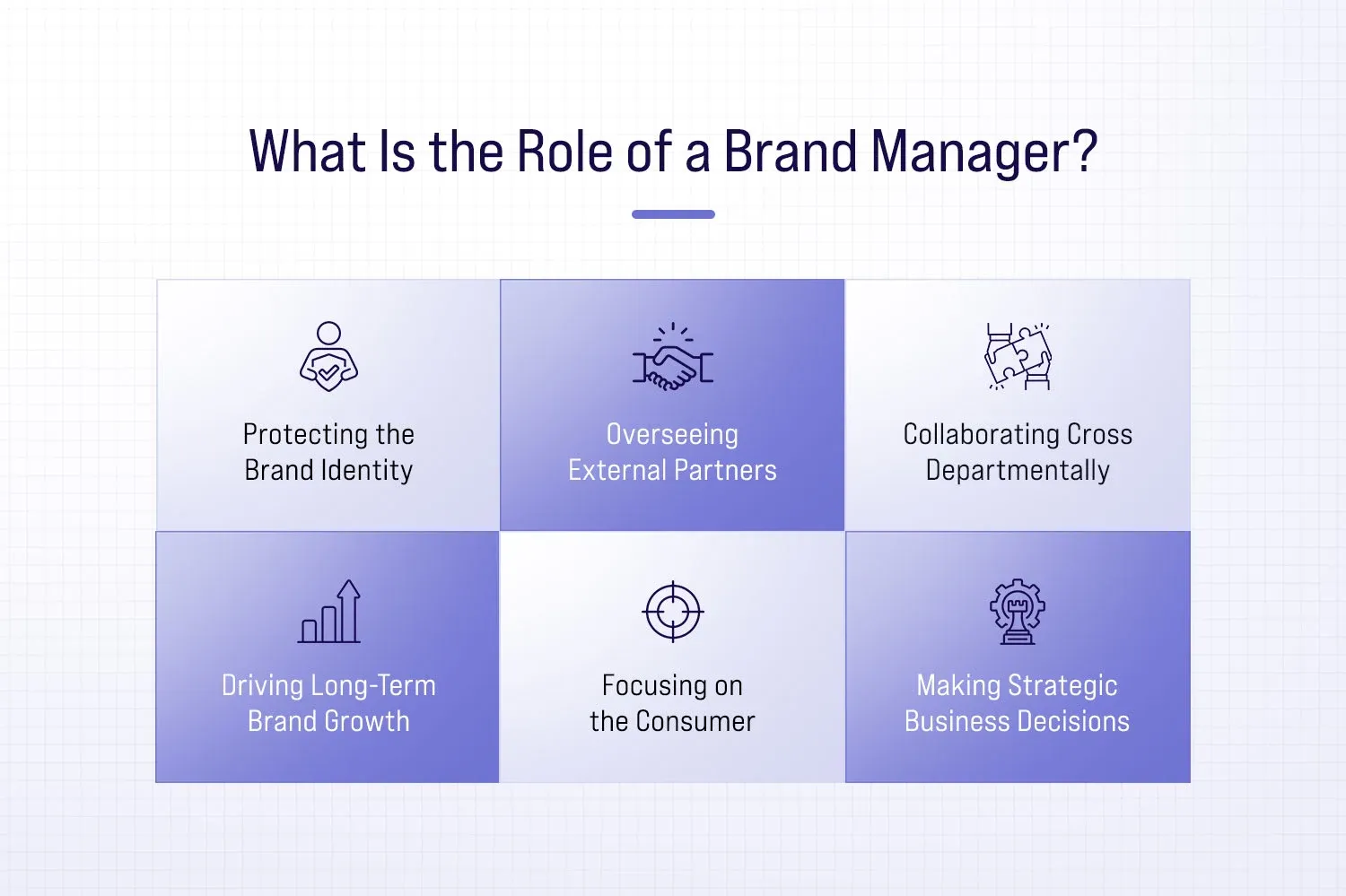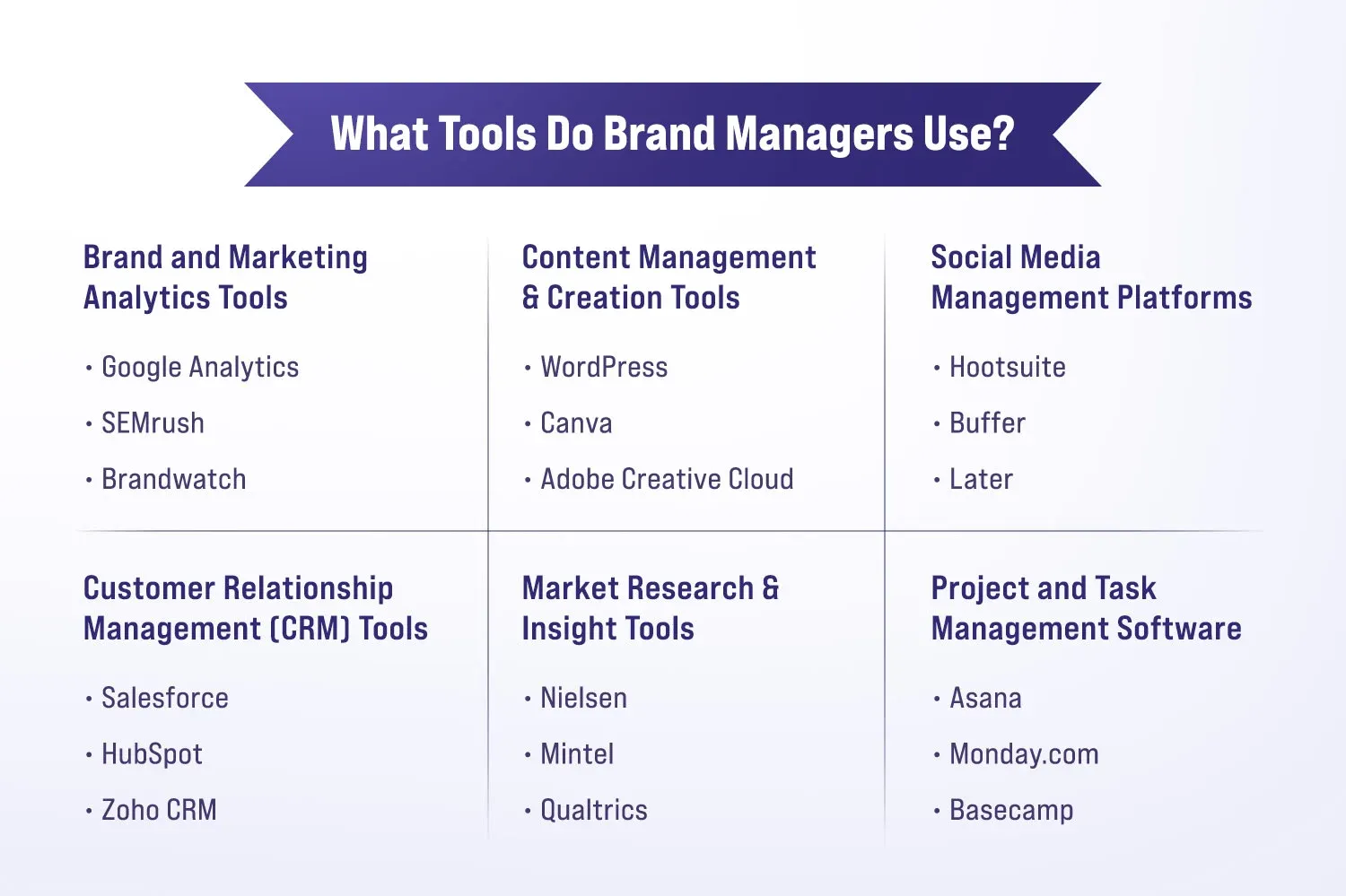How to Become a Brand Manager?

The world today is a saturated marketplace where consumers compare products based on various aspects and pick one over the other. But what defines these aspects that help consumers make their decision? To begin with, a well-crafted brand tells a story, builds trust, and forges emotional connections that drive long-term customer loyalty.
This is exactly where branding comes into play to ensure consistency, clarity, and desired impact. As businesses compete not just on price or features but on values and identity, the role of a brand manager has become more critical than ever.
This article takes you through what brand managers do, the skills they need, and the exact steps to break into this high-impact role.
Who Is a Brand Manager?
A brand manager is a marketing specialist tasked with crafting and controlling the public perception of a product, service, or organization. They build and maintain the brand’s image, voice, and values to strengthen customer loyalty and support long-term business growth. This involves working across teams to align messaging, ensure consistency, and monitor how the brand performs in the market.
Brand managers are not only strategic thinkers but also creative collaborators. They often guide the efforts of advertising, design, digital marketing, social media, and public relations teams to ensure every campaign reflects the brand’s identity and market goals.
What Is the Role of a Brand Manager?
The role of a brand manager is multifaceted, strategic, and central to the success of any business that aims to build a recognizable and trusted brand. Acting as both a strategist and a steward, a brand manager is responsible for shaping how a brand is perceived in the market and ensuring that every touchpoint, both internal and external, aligns with the brand’s purpose, values, and voice. Here’s a breakdown of what this role entails:

Protecting the Brand Identity
A brand manager strives towards protecting the identity and integrity of their brand. They act as guardians, ensuring that the essence of the brand, whether conveyed through messaging, visuals, product design, or customer experience, remains consistent across all channels. Their responsibilities include protecting the brand’s image and ensuring strict adherence to brand standards by both internal teams and external collaborators.
Collaborating Cross-Departmentally
Brand managers collaborate with various departments, including marketing, sales, product development, finance, and communications. This cross-functional engagement ensures that every team aligns to the brand strategy and that customer insights are embedded into product development, advertising efforts, and financial planning. This holistic coordination helps the brand remain competitive and strategically positioned in the market.
Overseeing External Partners
Brand managers work as the primary point of contact between a company and any third-party marketing or advertising agencies they are working with. Their job is to ensure that any campaigns or communications developed by such agencies stay true to the brand’s tone, purpose, and strategic goals. Brand managers review and approve all external outputs, both digital and offline, to maintain quality and consistency.
Focusing on the Consumer
An important part of a brand manager’s job is to stay deeply connected to the consumer mindset. They utilize market research, analyze consumer behavior, and track social media trends to gauge public perception and sentiment around the brand. By identifying what resonates with customers and what doesn’t, they can adjust messaging, refine positioning, and develop new ways to create emotional connections with the audience.
Making Strategic Business Decisions
Brand managers are also involved in high-level decision-making. They evaluate the effectiveness of brand-related initiatives, calculate return on investment (ROI) for campaigns, and provide insights that influence future marketing and corporate strategies. Whether assessing the success of a product launch or proposing adjustments to a campaign, their input supports data-driven decisions that shape the brand’s trajectory.
Driving Long-Term Brand Growth
Ultimately, brand managers are visionary leaders who look beyond immediate marketing goals. They are responsible for cultivating long-term brand equity by ensuring that the brand remains relevant, competitive, and desirable in the eyes of consumers. This involves dynamically adjusting strategies based on evolving market trends, consumer insights, and overarching business objectives.
Skills of a Brand Manager
To excel in brand management, professionals require a dynamic blend of creative, strategic, leadership and digital skills. A brand manager’s role demands the ability to craft compelling brand stories, navigate data, manage cross-functional teams, and maintain a consistent brand presence in an ever-evolving marketplace. Here are eight essential skills that every successful brand manager should master:
Creative Vision
At the core of brand management lies creativity, which is the ability to bring fresh ideas to life and differentiate a brand in a crowded market. Brand managers need expertise in developing creative campaign ideas, compelling visual narratives, and messaging that resonates while aligning with the brand’s core values. This creative edge helps brands stay memorable and emotionally connect with their audience.
Strategic Communication
Clear, persuasive communication is key to building brand trust and loyalty. Brand managers need to articulate the brand’s purpose, voice, and value across various platforms and to diverse stakeholders. Whether writing campaign copy, pitching to executives, or briefing designers, the ability to tailor messages effectively is crucial to maintaining a coherent brand image.
Data-Driven Decision Making
A great brand manager knows how to interpret numbers as well as narratives. Analytical thinking and data literacy allow brand managers to evaluate campaign performance, identify trends, and adjust strategies based on real-time insights. By transforming data into action, they can optimize marketing efforts and deliver measurable brand growth.
Leadership and Team Collaboration
Brand managers often serve as the point of connection between marketing teams, designers, sales departments, and external partners. Here, strong leadership is essential, not just to manage teams and timelines, but also to inspire creativity, align teams around a common brand vision, and drive strategic initiatives forward with clarity and purpose.
Consumer Insight and Empathy
Understanding the target audience is very important for brand managers, as they must deeply understand the needs, motivations, and behaviors of the consumer to build brand experiences that resonate. This means conducting market research, analyzing feedback, and staying attuned to cultural and social shifts that influence purchasing decisions.
Project and Time Management
From launching campaigns to coordinating rebrands, brand managers handle numerous projects with tight deadlines. Effective project management skills such as prioritization, delegation, and timeline planning are hence vital to ensure that brand initiatives are executed on time, within budget, and without compromising quality.
Brand Positioning
Establishing a brand’s distinct market position demands deliberate and strategic planning. Brand managers must craft a compelling value proposition, identify their competitive edge, and ensure consistency across all brand touchpoints. This precision fosters a distinctive and memorable brand presence, setting it apart in a competitive marketplace.
Adaptability and Market Awareness
Agility in adapting to shifting market dynamics is a critical advantage for brand managers. Whether reacting to a cultural trend, a competitor’s move, or a shift in consumer expectations, brand managers must remain agile. Staying informed about industry developments and being proactive allows brands to stay relevant and resilient.
How to Become a Brand Manager?
Becoming a brand manager is a strategic journey that blends education, practical experience, and the cultivation of specialized skills. If you're passionate about storytelling, consumer behavior, and brand-building, this career path offers both creative freedom and strategic influence. Below is a structured roadmap to help you transition into the role of a brand manager:
Get the Right Education
The foundation of a brand management career begins with a solid academic background. Majority of brand managers complete an undergraduate degree in fields such as marketing, business management, communications, or a similar discipline. These programs offer essential knowledge in consumer behavior, branding principles, marketing strategy, and market research.
For those looking to elevate their credentials, pursuing a master’s degree such as an MBA with a focus on marketing can be highly valuable, opening doors to more senior roles, especially in larger organizations or global brands.
Earn Professional Certifications
If you have completed your bachelor's degree in marketing or a relevant field and don't want to go for a traditional MBA, consider earning certifications in branding, digital marketing, or analytics to sharpen your skills further. Certifications are especially valuable if you’re transitioning from another field or want to stand out in a saturated job market.
Courses like the Chartered Institute of Marketing (CIM) qualifications, HubSpot Content Marketing Certification, or Google Ads and Analytics Certifications can enhance your digital marketing fluency and help you stay current with the latest tools and strategies used in brand development and campaign management.
Pursue Real-World Exposure
Many brand managers start in junior marketing positions, such as marketing assistants, content specialists, or social media coordinators. These roles help you sharpen your skills in market research, campaign execution, data analysis, and customer communication.
Over time, as you take on more complex projects, lead campaigns, and collaborate across departments, you’ll build the experience necessary to move into a brand manager role. Strong performance in these early roles, along with evidence of strategic thinking and leadership, can accelerate your growth.
Develop a Strong Portfolio and Network
Start compiling a portfolio that showcases successful campaigns, marketing strategies, or branding initiatives you've contributed to. Include measurable outcomes such as increased engagement, improved brand visibility, or ROI on campaigns you have worked on.
Furthermore, expanding your professional connections through industry conferences, marketing groups, and LinkedIn engagement can unlock mentorship, unlisted job prospects, and strategic partnerships.
What Tools Do Brand Managers Use?
Brand managers rely on a robust toolkit to execute strategies, analyze performance, streamline workflows, and maintain brand consistency. These tools are essential components that enable brand managers to stay agile, make informed decisions, and deliver compelling brand experiences across multiple platforms. Let’s explore the core categories of tools brand managers use, along with some popular platforms in each.

Brand and Marketing Analytics Tools
Effective brand management is rooted in insight. Analytics tools provide brand managers with a comprehensive view of campaign performance, audience behavior, and overall brand health. By utilizing these data-driven insights, they can optimize strategies and direct efforts toward high-impact areas.
Commonly Used Tools:
- Google Analytics: Delivers detailed reports on web traffic and user engagement, essential for evaluating digital campaign performance.
- SEMrush: Offers SEO, paid media, and content marketing insights to improve online visibility.
- Brandwatch: Enables social listening and sentiment analysis, helping brand managers monitor how their brand is perceived online.
Content Management and Creation Tools
Content is the voice of a brand, and managing it efficiently is key to maintaining consistency across all touchpoints. These tools help brand managers plan, produce, and publish brand-aligned content.
Popular Choices:
- WordPress: A widely used CMS that allows for seamless content publishing and website management.
- Canva: A drag-and-drop design tool ideal for creating quick, on-brand visuals for social media and marketing materials.
- Adobe Creative Cloud: The premier suite for professional design, featuring essential applications like Photoshop, Illustrator, and InDesign.
Social Media Management Platforms
Social platforms are often the front lines of brand interaction. Managing multiple social channels efficiently requires platforms that support scheduling, engagement, and analytics—all in one place.
Top Tools:
- Hootsuite: Manages multiple social profiles, schedules posts, and offers detailed performance analytics.
- Buffer: Simplifies social media publishing and provides performance metrics for optimization.
- Later: Especially valuable for Instagram marketing, offering visual content planning and scheduling.
Customer Relationship Management (CRM) Tools
Cultivating and overseeing customer relationships is fundamental to fostering long-term brand allegiance. CRM tools provide brand managers with detailed consumer insights, enabling tailored and meaningful brand interactions.
Leading Platforms:
- Salesforce: A powerful CRM that centralizes customer data and supports tailored marketing efforts.
- HubSpot: Combines CRM with inbound marketing tools to engage and nurture leads effectively.
- Zoho CRM: Provides a suite of automation tools for tracking customer interactions and improving sales performance.
Market Research and Insight Tools
Staying attuned to industry shifts and anticipating customer demands is crucial for brand managers. Market research tools provide critical data that guides brand positioning and product development.
Trusted Tools Include:
- Nielsen: Offers detailed market intelligence and consumer insights.
- Mintel: Delivers expert market reports, competitive analysis, and emerging trend data.
- Qualtrics: A robust survey and research tool used to gather customer feedback and measure brand sentiment.
Project and Task Management Software
With so many moving parts in brand campaigns, staying organized is non-negotiable. These platforms assist brand managers in organizing workflows, delegating responsibilities, and enhancing cross-functional teamwork.
Commonly Used Tools:
- Asana: Streamlines task tracking and team coordination with intuitive project boards and timelines.
- Monday.com: Centralizes workflows, making it easier to align marketing, creative, and product teams.
- Basecamp: Combines project management with team communication features to keep everyone on the same page.
FAQs
Q1. Is brand manager a high position?
Ans: Yes, a brand manager holds a significant and strategic role within a company. While the exact level may vary depending on the organization's size and structure, brand managers are typically responsible for overseeing the entire brand strategy, from development to execution. In many companies, especially those with consumer-facing products, brand managers often report to senior marketing executives and are considered key decision-makers.
Q2. What is a brand manager Vs. a marketing manager?
Ans: Although both roles fall under marketing, their core responsibilities vary significantly. A brand manager is primarily concerned with the development, positioning, and consistency of a brand. They ensure that all touchpoints, starting from visuals, messaging, and customer experiences, align with the brand’s identity and long-term vision.
Conversely, a marketing manager handles wider marketing activities, including strategy execution, budget management, and customer acquisition efforts. While brand managers protect and build the brand image, marketing managers focus on promoting products or services to drive revenue. In short, brand managers focus on perception and positioning, while marketing managers focus on execution and performance.
Summing Up
Brand managers are essential to shaping how a business is perceived, ensuring consistency across all brand touchpoints, and driving long-term customer loyalty. Their role blends strategy, creativity, and analytics to position brands effectively in a crowded market.
By gaining the right education, building practical experience, and mastering key tools and skills, you can successfully break into this impactful career. If you're passionate about brand storytelling and influencing consumer perception, becoming a brand manager is a rewarding path worth pursuing.

